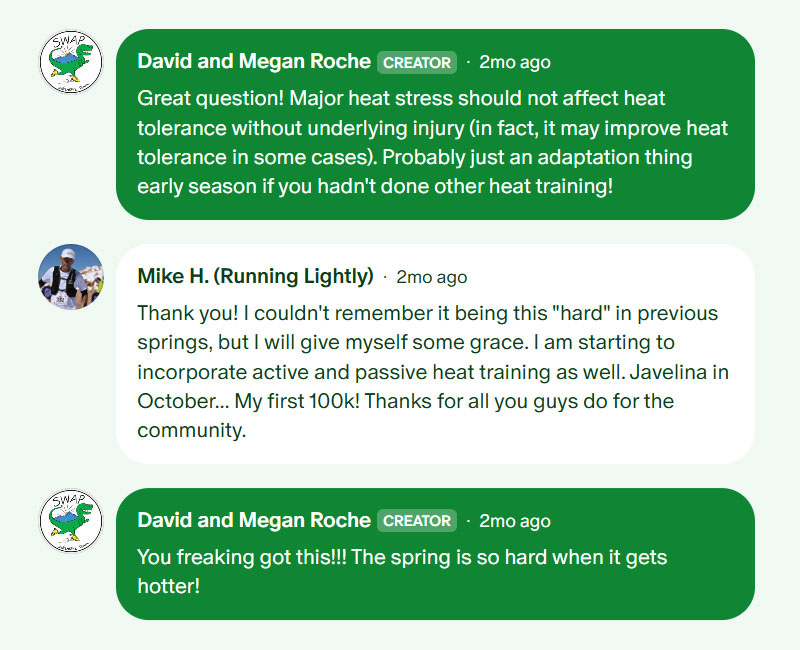Why Do I Struggle to Run in the Heat?
The One High-Impact Factor Many Runners Overlook
I recently asked the hosts of the popular running podcast Some Work All Play a question. David and Megan Roche devote a lot of time to listener topics, always responding with a fun mix of positivity, good humor, and serious science.
My question was about heat intolerance, why it might feel more acute for me lately, and if it could be related to “overexposure” from time in the tropics. I nearly pushed myself into overtraining in Hawaii last year, and who knows, maybe heat is like peanut butter… Too much and you become sensitized.
The Roches responded via Patreon:
I took solace. But now, after several months of progressively warmer running and even some intentional heat training, my tolerance isn’t improving much and I’m beginning to wonder if my podcast heroes might have missed a key clarifying question.
More Than a Feeling
When the mercury rises in spring, many runners in temperate climates (even those of us who rocked shorts all winter) have a hard time adjusting. We might feel sluggish and inefficient, and it’s not our imaginations. There are physiological reasons for the elevated heart rate and general funk of early summer runs.
In hot weather, our body has to split resources between powering our running muscles and keeping us cool. Blood is shunted to the skin for cooling, which means less oxygen for working muscles. Heart rate climbs to compensate, and—under typical conditions—we sweat earlier and more heavily, leading to quicker dehydration and electrolyte loss. But that’s just the physical half of the struggle.
Then there’s the pesky brain. As core temperature rises, fatigue signals are triggered earlier than usual, which makes usual paces feel unusually hard. This mental muck can drag us into a sulk spiral.
What They Missed
Okay, so that’s an “everyone problem.” Most humans will experience some difficulty in the heat, relative to cooler runs. But this is about meeeee (does best Violet Beauregarde impression). What I think is going on, is I have become (dramatic pause) an older gentleman.
The question the Roches should have asked is, “What’s your age?”
As I dug into the topic, I learned getting older doesn’t just mean reading glasses and sensible shoes. It also means our once-reliable heat tolerance starts to shift, whether we notice it gradually or, as for me, it drops off a cliff.
By our late 40s and early 50s, a handful of changes start to show up:
Sweat glands become less responsive, which delays the cooling process
Skin blood flow slows, so less heat is released from the body’s surface
Plasma volume declines, so less blood is available for cooling and muscle work
Cardiac drift increases, which can spike heart rate more dramatically in heat
We develop an inexplicable, increased interest in birds
On top of that, as we age, hormonal shifts can affect fluid regulation, blood pressure response, and energy metabolism. None of these are necessarily problematic; they’re just part of the normal weirdness of aging and can exacerbate heat intolerance.
So, if you’re over 50 and wondering why summer jogs feel sloggy this year, it may not be about fitness. It could be physiology. If you’re younger and still tolerating heat well, give thanks. And mind the bird watching… It sneaks up on you.
What Can Be Done?
In theory, the solution to heat intolerance is simple: we need to acclimate (or, as my granddad might have advised, “Toughen up, kid”).
By training in warm conditions, our bodies adapt. Sweat rate increases, the heart doesn’t have to work as hard, and core temperature rises more slowly. All this leads to a lower perceived rate of exertion and a calmer mind.
The changes can begin within a few days. It is a beautiful system of feedback and adjustment that taps into the oldest texts of our DNA.
In practice, applying intentional, consistent, progressive heat stressors will indeed toughen us up. For older runners, as I am discovering, the picture is just slightly more complex. We have a fourth assignment: patience.
The Long Game
The rules of hot weather running change with age. But they are rules we can work with. While my early season has been a struggle, I’m understanding that older runners can adapt. We just need to be a little more deliberate, and a lot more patient.
It might mean combining active exposure (runs in the heat, perhaps a bit overdressed) with passive methods (like sauna or hot tub sessions). It might mean slowing down more than we like. But it is possible. When we embrace the mystery of running and sink softly into process, our bodies will respond.
Run lightly,
-mike
Next: 🌵Javelina Diaries 04 // Training for 60 Miles in the Desert
Enjoy Running Lightly? Consider becoming a paid subscriber for less than $1 a week.




I see we both got over our writing block! Great post and looking forward to hearing more about your prep for Javelina 100K!
Regular saunas leading up to summer helps acclimatise too 🙌